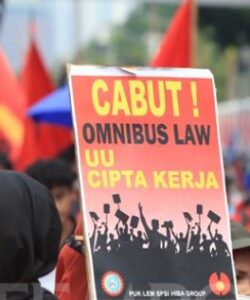
The foto has taken from www. tempo.co
STRATEGIC ASSESSMENT. President Joko “Jokowi” Widodo presented a new year gift in the form of a government regulation in lieu of law (Perppu) on job creation. Signed on Dec. 30, 2022, Perppu No. 2/2022 replaced the Job Creation Law that in late 2021 was declared conditionally unconstitutional by the Constitutional Court (MK) and therefore had to be revised within two years in a process that must include meaningful public participation.
The Perppu is 1,117 pages long and consists of 186 articles with changes to several articles such as rules of employment, minimum wages and arrangements for outsourced workers. For example, the regulation eliminates the right to two days off in a week for workers as stipulated in Article 79 Paragraph (2b). According to the regulation, workers deserve one day off the weekly break for six working days. Law No. 13/2009 on Employment regulates two days off a week for workers. Additionally, the jobs law says outsourcing can be open to all business sectors, but the regulation changes that to some sectors.
According to the Manpower Ministry, the Perppu was issued because the state needs to ensure the citizens’ rights to work and a decent living through the Job Creation Law. The government also sees the need for broad employment absorption as well as adjustments to various regulatory aspects relating to the facilitation, protection and empowerment of cooperatives and micro, small and medium enterprises (MSMEs). In addition, the regulation was said to implement the MK’s order for the revision of the Job Creation Law.
The government has issued a regulation in lieu of the job creation law to provide a secure footing for key economic policies in the face of global uncertainties and a gloomy outlook for 2023 which require rapid and appropriate responses, Justice Minister Yasonna Laoly said in an exclusive interview with BTV news broadcaster on Thursday evening.
The law stipulates a series of major policy changes aimed at improving the business and investment climate that will eventually create more jobs in the country. “If we don’t make a significant breakthrough and structural reform to improve the business climate now, it will be too late for us to make corrective measures later,” Yasonna said.

According to him, the issuance of an emergency regulation was deemed necessary after the Constitutional Court froze the law and gave the government two years to amend and ensure that its adoption involves public participation following a legal motion by some elements of the society last year.
Law and Human Rights Minister Yasonna Laoly said public criticism against the government regulation in lieu of law or Perppu on job creation was normal. He asserted that a policy cannot fulfill 100 percent of people’s aspirations. However, he claimed the government exercised efforts to listen to the people right after the Constitutional Court declared the Job Creation Law unconstitutional.
“So we have input, there have been changes, especially in the workforce,” said Yasonna. Yasonna also said the ratification of the Perppu was based on an analysis of global economic conditions. For this reason, he said the Perppu was aimed at tackling future global uncertainties.
Vice President Ma’ruf Amin said the government regulation in lieu of law was needed to avoid confusion among investors, explaining it was the government’s way of making sure that the economy’s wheels kept turning after it was determined that the Job Creation Law needed correction.
Manpower Minister Ida Fauziyah said in terms of employment, the Government Regulation in Lieu of Law No. 2/2022 on job creation demonstrates the government’s commitment to providing labor protection and business continuity in order to respond to the challenges of evolving labor dynamics.
She explained that the employment substance regulated in the regulation was essentially a refinement of the previous regulation, namely Law 11/2020 on job creation.
The Alliance of Independent Journalists (AJI) Indonesia criticized the government’s decision to issue government regulation in lieu of law concerning job creation as it was issued without public participation or input, including from the press community.
AJI Indonesia urged President Jokowi to revoke the regulation because it contradicted a November ruling by the Constitutional Court. AJI Indonesia believes that the regulation has a significant impact on all workers in the country, including media workers. There are a number of articles in the employment cluster in the regulation that are detrimental to the working class. AJI Indonesia also calls on the House of Representatives to reject the regulation.
Labor Party and Indonesian Trade Union Confederation (KSPI) President Said Iqbal said that tens of thousands of people from his party, trade unions, and farmers’ unions would hold protests in front of the State Palace on Saturday. The protest will take place because a number of workers’ expectations for the government regulation in lieu of law on job creation were not met. The Manpower Ministry, according to Iqbal, has gathered a number of trade union groups, including KSPI, to hear aspirations. KSPI, on the other hand, determined that the government’s response to the union’s main complaints was insufficient.
The controversial Omnibus Law, officially known as Law of Job creation, was passed in Parliament in October 2020, but declared unconstitutional by the Indonesian constitutional court. The Indonesian Trade Union Confederation (KSPI), Confederation of All Indonesian Workers’ Union (KSPSI), Confederation of United Indonesian Workers (KPBI) and others, along with the Indonesian Labour Party, have rejected the new regulation.
Unions and the party claim that some provisions in the regulation have given governors discretionary power to determine minimum wage. For instance, the insertion of the word “may”, the vague variable index, and the power of the governor to adopt a different formula could exclude particular industries from the minimum wage regulation and infringe workers’ rights.
The act of a million workers alliance issued a statement in response to the government regulation in lieu of law (Perppu) on job creation. Indonesian Workers Union Confederation (KSPSI) Chair Muh Jumhur Hidayat on Thursday said the alliance is committed to urging the revocation of the regulation and the Omnibus Law to ensure workers’ welfare.
A number of civil society groups filed a judicial review of the regulation in lieu of law (Perppu) on job creation issued by President Jokowi to the Constitutional Court (MK). The plaintiff’s representative, Viktor Santoso Tandiasa, deemed the government’s actions as a violation of the law.
Viktor acknowledged that challenging the regulation at the Constitutional Court will be fruitless as it takes a long time. He was also worried that the object of the lawsuit, the Perppu, could be passed into law by the House before the judicial review was processed.
Former Constitutional Court chief justice Jimly Asshiddiqie said that the issuance of Government Regulation in Lieu of Law (Perppu) No. 2/2022 concerning job creation violated the principle of rule of law.
Jimly said the Job Creation Law No. 11/2020, which was declared conditionally unconstitutional by the Constitutional Court, should be corrected through revision, not by government regulation in lieu of law.
He said believes that seven months is sufficient time to draft a new Job Creation Law as well as improve the substance of the articles and paragraphs that have been challenged by the public.
House Deputy Speaker Sufmi Dasco Ahmad said that the parliament has yet to take a stand on the issuance of Government Regulation in Lieu of Law No. 2/2022 concerning job creation, adding that the House would discuss the regulation, which drew public controversy, during next week’s session, after the recess period ended on Jan. 10.
House Legislation Body Deputy Chair Achmad Baidowi confirmed that members of the House will discuss the regulation in lieu of law on job creation once recess ends on Jan. 10. Baidowi asserted that members of the House can only accept or disapprove of a government regulation in lieu of law and are not authorized to change its substance.
However, he elaborated that the copy of the regulation has not been officially sent by the government to the House. In terms of the urgency behind the issuance of the government regulation, the House member said it is based on the government’s perspective and subjectivity.
Both laborers and businesses have expressed their concerns over government regulation in lieu of law on job creation, with the issues of minimum wage and job security remaining contested. Indonesian Employers Association (Apindo) Chair Hariyadi Sukamdani said that businesses were surprised by the sudden announcement of this regulation, as he said that his association was not involved in its discussion.
As a result, Apindo needs more time to “comprehensively” assess more than one thousand pages of the new regulation, which spans 10 clusters including the ones on manpower issues. Although stating that Apindo understood the government decision, he said that the new minimum-wage formula in the Perppu, which includes both inflation and GDP growth rate, would shrink the job market.








